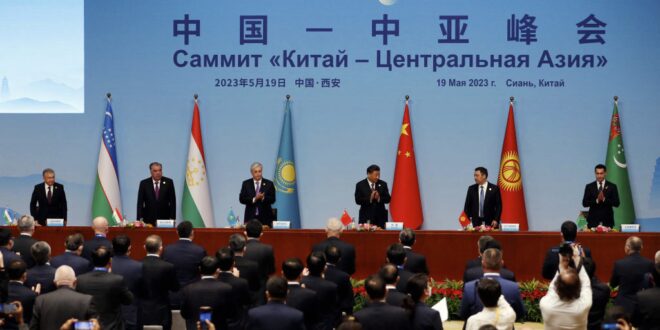Communist China’s People’s Liberation Army has established a military presence in Murghab, Tajikistan, close to the Chinese border with Afghanistan. There is also no doubt that Russia’s embarrassing military imbroglio in Ukraine has helped China supersede Moscow as guarantor of Central Asian state sovereignty.
[Kazakh President Kassym-Jomart] Tokayev has…. denounced Russia’s invasion of Ukraine. As the Kazakh leader is doubtless aware, some notable Russian nationalists such as former Russian Prime Minister and President Dmitry Medvedev have mused that, after Ukraine is dealt with, Kazakhstan will follow.China offers Central Asia four basic dimensions of assistance that Russia can no longer provide: financial investment, complementary commerce, development of transport infrastructure, and construction of industrial plants such as oil refineries.
China is building a Chinese-Kyrgyzstan-Uzbekistan railway, which will ultimately span the expanse of Central Asia to the Middle East. Beijing appears determined to link China and Europe by fashioning thoroughfares that avoid crossing Russian territory that pass through a mid-level corridor of the Caucasus countries.
In exchange, China will be granted wide access to Central Asia’s considerable energy resources. Chinese companies, for example, appear eager to tap into Turkmenistan’s vast natural gas reserves. Chinese oil corporations would also likely dominate Kazakhstan’s petroleum export market to service China’s insatiable desire for more fuel.
It increasingly looks as if that there is some truth in French President Emmanuel Macron’s comment that Russia appears to have become China’s vassal state. It certainly seems as if the Chinese Communist Party has made considerable progress toward achieving its broad objectives of fostering China’s Global Development and Security Initiatives. Neither plan appears to have a principal role for Moscow.
China recently hosted a summit of the leaders of Central Asia’s former Soviet Republics in Xi’an, China, the site of the start of the ancient Silk Road. The symbolism attached to Xi’an as the site for the 18-20 May gathering underscores China’s intent to remind Central Asian leaders that Chinese civilization’s relationship with the region predates ties to Russia by centuries. It also might demonstrate China’s resolve to replace Russia as Eurasia’s hegemon. China, in fact, did not even invite Russia to the conference.
After the implosion of the multinational Soviet Union, China and Russia seemed to have agreed upon a division of labor in their links to their Central Asian neighbors, with Russia assuming the role of the military guarantor of regional stability. For more than a decade, Russia seemed content with China’s leading role in Central Asian commerce, investment, and most economic affairs.
This is no longer true: China is moving to dominate in all dimensions in Central Asia. This is an historic evolution. Beijing’s eclipsing of Moscow means the end of Russia’s regional imperium in Central Asia. Russian Tsars and commissars have reigned supreme on the Central Asian steppes since the mid 19th century.
The Kremlin has had a military presence in Tajikistan since 1992, when it deployed a division to prevent armed Islamists from seizing the capital Dushanbe. Now much of that unit has been stripped to support Russia’s war against Ukraine.
Now, Communist China’s People’s Liberation Army has established a military presence in Murghab, Tajikistan, close to the Chinese border with Afghanistan. There is also no doubt that Russia’s embarrassing military imbroglio in Ukraine has helped China supersede Moscow as guarantor of Central Asian state sovereignty.
The Kremlin’s history of oppressive rule in Central Asia also does little to inspire trust in Russia’s motive to act as protector. In 2021, for instance, when fighting broke out in between factions of the Kazakh elite, Russia dispatched troops to Kazakhstan to stabilize the government of President Kassym-Jomart Tokayev. Those Russian forces have now withdrawn. While the Russian troops helped to restore order, Tokayev possibly remembers Russian President Vladimir Putin’s statement, that “Kazakhstan never had a state.”
Tokayev has, moreover, denounced Russia’s invasion of Ukraine. As the Kazakh leader is doubtless aware, some notable Russian nationalists such as former Russian Prime Minister and President Dmitry Medvedev have mused that, after Ukraine is dealt with, Kazakhstan will follow.
The Chinese military presence in Tajikistan, close to China’s border with Afghanistan, is possibly designed to guard against jihadist Taliban infiltration from Afghanistan into China. Accordingly, Chinese President Xi Jinping called upon Central Asia’s leaders at the Xi’an Summit to denounce the “Three Nos” of “Separatism, Terrorism, and Extremism”. He also warned that regional leaders must guard against Western-inspired democratic “color revolutions.”
China offers Central Asia four basic dimensions of assistance that Russia can no longer provide: financial investment, complementary commerce, development of transport infrastructure, and construction of industrial plants such as oil refineries. These projects would also help sop up Central Asia’s large number of unemployed laborers. Presently, China is investing more than $15 billion in five states of Central Asia. China’s trade with these same five countries in 2022 amounted to more than $70 billion.
After some delay, China is building a Chinese-Kyrgyzstan-Uzbekistan railway, which will ultimately span the expanse of Central Asia to the Middle East. Beijing appears determined to link China and Europe by fashioning thoroughfares that avoid crossing Russian territory that pass through a mid-level corridor of the Caucasus countries.
In exchange, China will be granted wide access to Central Asia’s considerable energy resources. Chinese companies, for example, appear eager to tap into Turkmenistan’s vast natural gas reserves. Chinese oil corporations would also likely dominate Kazakhstan’s petroleum export market to service China’s insatiable desire for more fuel.
Xi, rather than Putin, appears in the driver’s seat. It increasingly looks as if that there is some truth in French President Emmanuel Macron’s comment that Russia appears to have become China’s vassal state. It certainly seems as if the Chinese Communist Party has made considerable progress toward achieving its broad objectives of fostering China’s Global Development and Security Initiatives. Neither plan appears to have a principal role for Moscow.
 Eurasia Press & News
Eurasia Press & News




